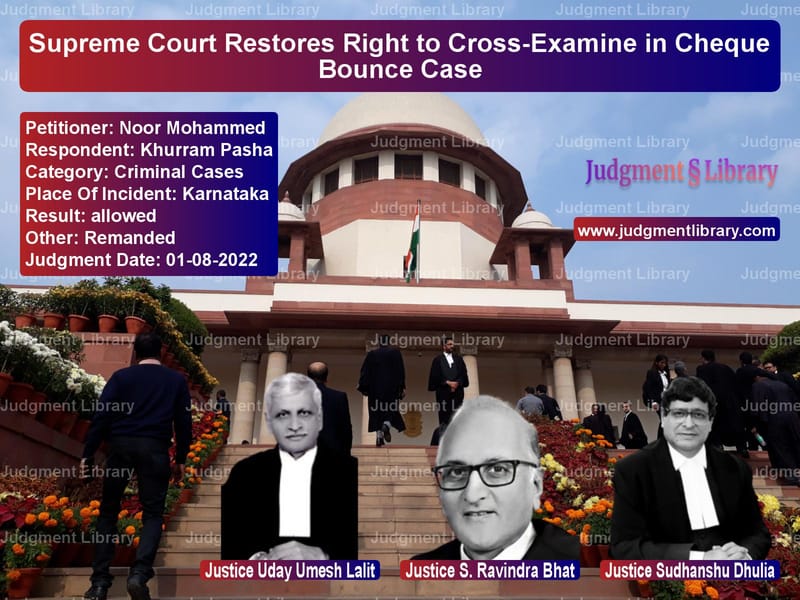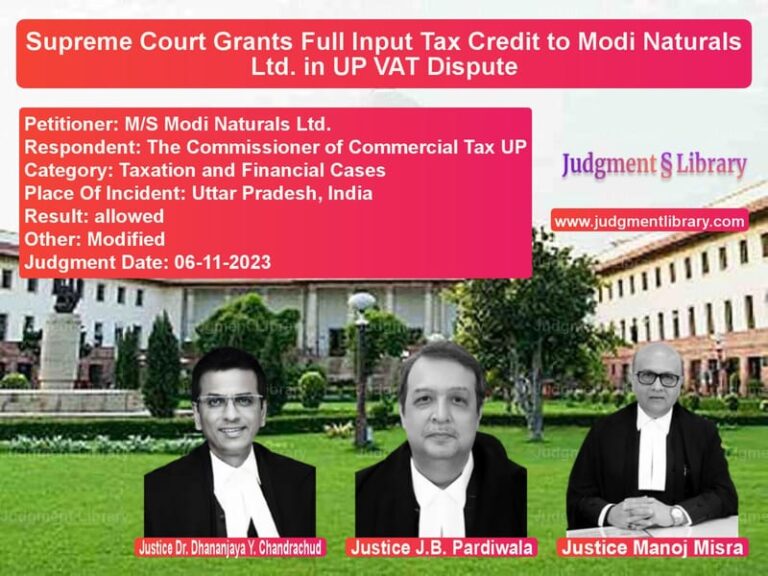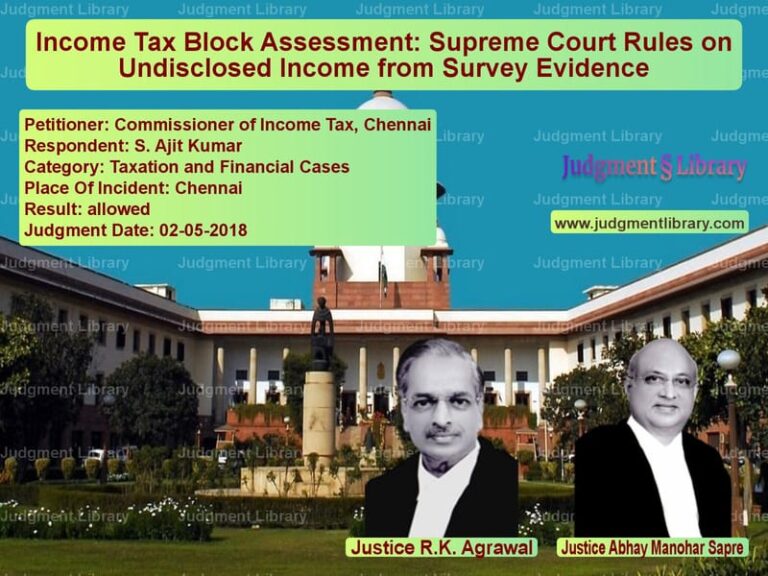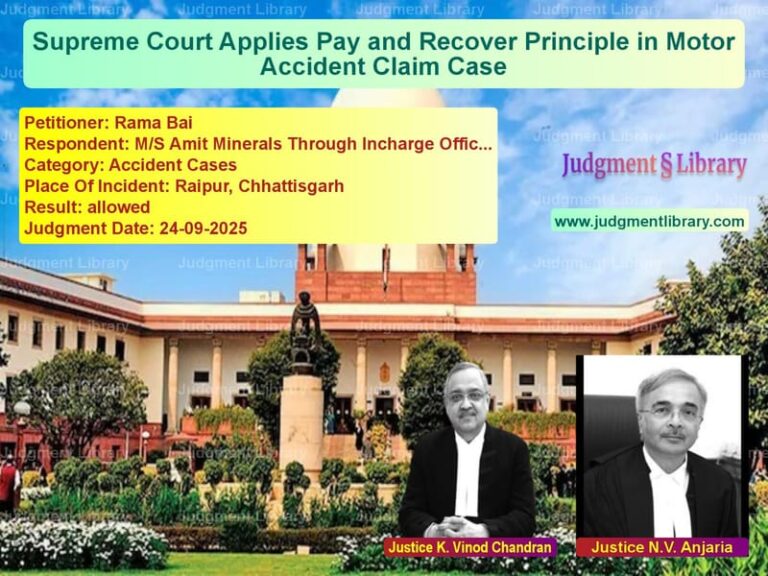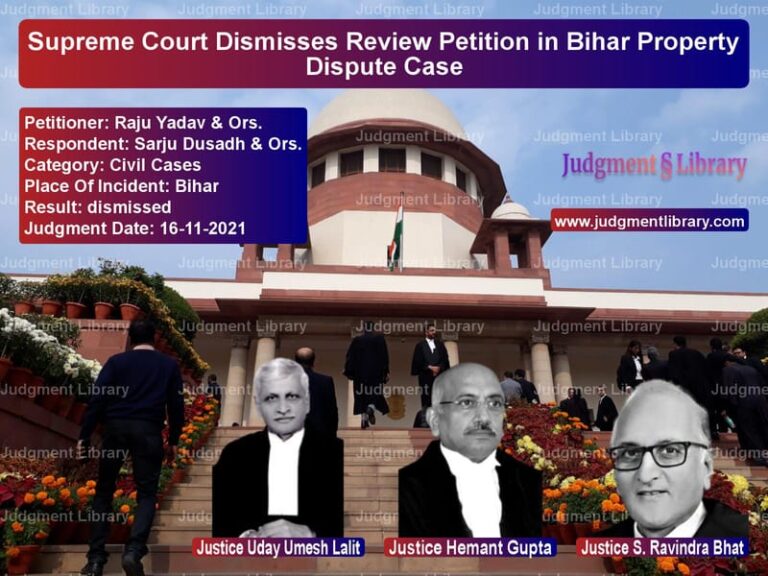Supreme Court Restores Right to Cross-Examine in Cheque Bounce Case
The Supreme Court of India, on August 2, 2022, delivered a significant judgment in the case of Noor Mohammed vs. Khurram Pasha. The case arose from a cheque bounce dispute under Section 138 of the Negotiable Instruments Act, 1881. The appellant, Noor Mohammed, had challenged the decision of the Karnataka High Court, which upheld his conviction and denied him the right to cross-examine the complainant due to non-payment of interim compensation under Section 143A of the Act.
The Supreme Court ruled that failure to deposit interim compensation cannot result in the denial of the right to cross-examine a witness. The judgment reinstated the trial, allowing the appellant to cross-examine the complainant and ensuring a fair trial.
Background of the Case
The case stemmed from a complaint filed by Khurram Pasha against Noor Mohammed under Section 138 of the Negotiable Instruments Act, alleging that a cheque of Rs.7,00,000 issued by the appellant had bounced due to insufficient funds. The complainant followed legal procedures:
- The cheque was issued on February 25, 2019, and presented for encashment on March 1, 2019.
- The cheque was dishonored due to “insufficient funds” in the appellant’s account.
- A statutory notice was issued on March 12, 2019, demanding repayment.
- With no repayment made, the complainant initiated proceedings under Section 138.
Trial Court Proceedings
Upon taking cognizance of the complaint, the Trial Court issued summons to the appellant. On August 16, 2019, the appellant appeared through counsel. The court directed the appellant to deposit 20% of the cheque amount (Rs.1,40,000) as interim compensation under Section 143A of the Act within 60 days.
Despite an extension, the appellant failed to deposit the amount. When the matter proceeded to witness examination, the appellant’s request to cross-examine the complainant under Section 145(2) of the Act was rejected by the Trial Court due to non-payment of interim compensation. The Trial Court convicted the appellant and imposed:
- A fine of Rs.7,00,000.
- In default, six months of simple imprisonment.
- Out of the fine, Rs.6,95,000 was directed to be paid as compensation to the complainant under Section 357 of the Criminal Procedure Code.
High Court Appeal
The appellant challenged the conviction before the Karnataka High Court. The High Court upheld the Trial Court’s decision, observing:
“The conduct of the accused in not depositing interim compensation shows that he was only interested in protracting proceedings.”
The High Court ruled that failure to deposit the interim compensation justified denial of the right to cross-examine the complainant.
Arguments Before the Supreme Court
Petitioner’s (Noor Mohammed) Arguments
Senior Advocate Shailesh Madiyal, representing the appellant, contended:
- Denial of Cross-Examination: The right to cross-examine a witness is fundamental to a fair trial and cannot be denied due to non-payment of interim compensation.
- Misinterpretation of Section 143A: The provision allows for recovery of compensation as a fine but does not empower courts to deny procedural rights.
- Prejudice to the Accused: The Trial Court convicted the appellant without allowing him to present a defense.
Respondent’s (Khurram Pasha) Arguments
Senior Advocate Anand Nuli, representing the complainant, argued:
- Compliance with Section 143A: The appellant failed to deposit the required compensation despite multiple extensions.
- Delay Tactics: The appellant was using procedural rights to prolong the case.
- Rightly Convicted: The Trial Court had acted within legal limits in denying cross-examination.
Supreme Court’s Observations
1. Right to Cross-Examine Cannot Be Denied
The Supreme Court ruled:
“The concerned provision nowhere contemplates that an accused who had failed to deposit interim compensation could be fastened with any other disability, including denial of the right to cross-examine the witnesses.”
The Court emphasized that the denial of cross-examination was a violation of the principles of natural justice.
2. Purpose of Section 143A
The Court clarified the scope of Section 143A:
“The provision allows for interim compensation recovery as if it were a fine but does not curtail any procedural rights of the accused.”
3. Protection of Fair Trial
The judgment reinforced that procedural safeguards must be upheld:
“The right to cross-examine is a fundamental part of a fair trial. The lower courts’ decisions suffer from an inherent illegality.”
Final Judgment
The Supreme Court allowed the appeal, stating:
“The appeal is allowed. The conviction is set aside. The case is restored to the Trial Court with directions to permit cross-examination and proceed to a logical conclusion.”
Additionally, the Court directed:
- The appellant must deposit Rs.1,40,000 (20% of the cheque amount) as interim compensation.
- The Registry must transfer the deposited amount to the Trial Court.
- The Trial Court must proceed without delay, ensuring a fair trial.
Impact of the Judgment
The ruling has significant implications for cheque bounce cases:
- Protects the Right to Cross-Examine: Ensures that accused persons are not unfairly deprived of procedural rights.
- Clarifies Section 143A: Establishes that failure to pay interim compensation does not bar cross-examination.
- Prevents Procedural Misuse: Ensures fair trial principles are upheld while allowing courts to enforce monetary penalties.
Conclusion
The Supreme Court’s ruling in Noor Mohammed vs. Khurram Pasha is a landmark judgment in cheque bounce cases. It ensures that procedural safeguards remain intact, preventing undue restrictions on the accused’s rights. The Court’s decision reinforces the principle that procedural fairness cannot be sacrificed, even in cases where financial obligations are not met.
Petitioner Name: Noor Mohammed.Respondent Name: Khurram Pasha.Judgment By: Justice Uday Umesh Lalit, Justice S. Ravindra Bhat, Justice Sudhanshu Dhulia.Place Of Incident: Karnataka.Judgment Date: 01-08-2022.
Don’t miss out on the full details! Download the complete judgment in PDF format below and gain valuable insights instantly!
Download Judgment: noor-mohammed-vs-khurram-pasha-supreme-court-of-india-judgment-dated-01-08-2022.pdf
Directly Download Judgment: Directly download this Judgment
See all petitions in Fraud and Forgery
See all petitions in Bail and Anticipatory Bail
See all petitions in Judgment by Uday Umesh Lalit
See all petitions in Judgment by S Ravindra Bhat
See all petitions in Judgment by Sudhanshu Dhulia
See all petitions in allowed
See all petitions in Remanded
See all petitions in supreme court of India judgments August 2022
See all petitions in 2022 judgments
See all posts in Criminal Cases Category
See all allowed petitions in Criminal Cases Category
See all Dismissed petitions in Criminal Cases Category
See all partially allowed petitions in Criminal Cases Category

